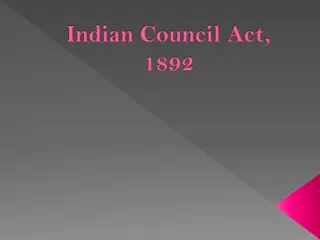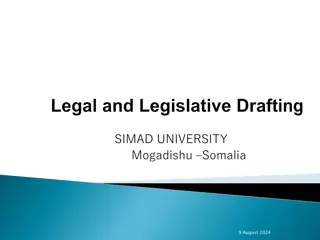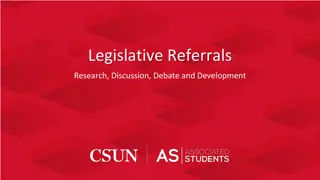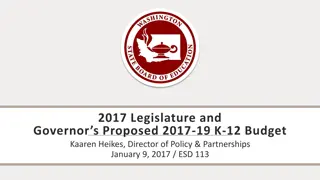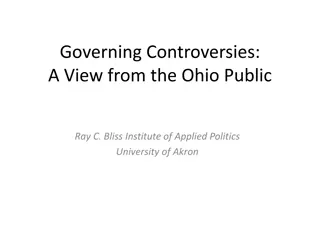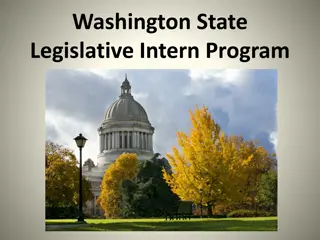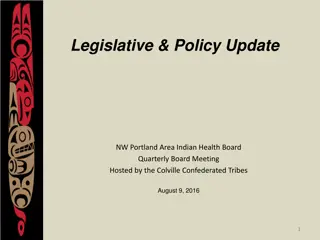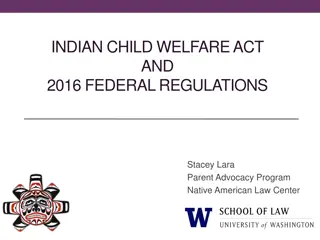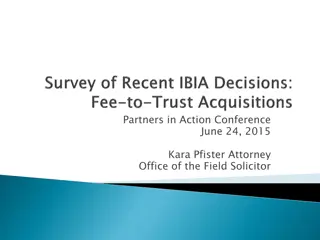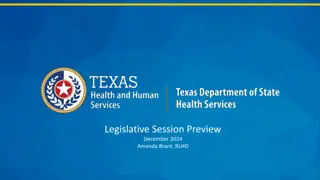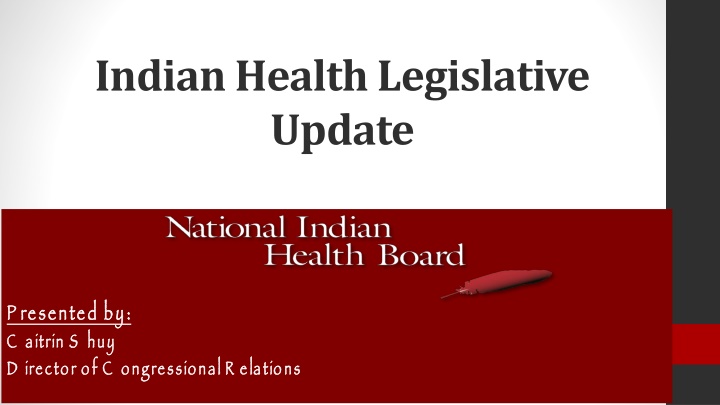
Indian Health Legislative Update: Current Issues and Concerns
This update presents the current legislative issues surrounding Indian health, focusing on the Affordable Care Act repeal and replace efforts. It highlights key bills, tribal opposition to proposed changes, and the potential impact on Medicaid funding for Native American communities.
Download Presentation

Please find below an Image/Link to download the presentation.
The content on the website is provided AS IS for your information and personal use only. It may not be sold, licensed, or shared on other websites without obtaining consent from the author. If you encounter any issues during the download, it is possible that the publisher has removed the file from their server.
You are allowed to download the files provided on this website for personal or commercial use, subject to the condition that they are used lawfully. All files are the property of their respective owners.
The content on the website is provided AS IS for your information and personal use only. It may not be sold, licensed, or shared on other websites without obtaining consent from the author.
E N D
Presentation Transcript
Indian Health Legislative Update P resented C aitrin S huy D irector of C ongressional R elations P resented by: C aitrin S huy D irector of C ongressional R elations by:
Current Legislative Issues House Bill Senate Bill Issue Affordable Care Act Repeal and Replace H.R. 1628 - Special Diabetes Program for Indians (SDPI) Reauthorization Act of 2017 H.R. 2545 S. 747 Restoring Accountability in the IHS Act H.R. 2662 S. 1250 Native Health Access Improvement Act H.R. 3704 Native Health and Wellness Act H.R. 3706
Affordable Care Act Repeal and Replace Congressional Republicans vow to repeal and replace the Affordable Care Act Legislation (H.R. 1628) passed the House in May by 217-214 Senate considered similar legislation but it did not garner the 50 votes needed by deadline of Sept. 30 Draft bills would have: Ended Cost-sharing reductions Drastically reformed (and cut) Medicaid to states Expanded 100% FMAP for AI/ANs to all providers Ended Individual and Employer Mandates Eliminated Prevention and Public Health Fund Kept IHCIA intact as well as other provisions pertaining to Indian Health
Affordable Care Act Repeal and Replace Tribes universally opposed these proposals largely due to cuts in Medicaid. NIHB/NCAI/NCUIH/ SGCE sent a letter to Senate Leaders on June 27: 1. Maintain Medicaid funding based on need, rather than capping it according to a complicated per capita allocation formula or through capped block grants. 2. Continue Medicaid Expansion, and at the very least, continue Medicaid Expansion for AI/ANs 3. Protect AI/ANs from barriers to care that are inconsistent with the federal trust responsibility, such as work requirements under Medicaid 4. Retain cost-sharing protections at Section 1402 of the Patient Protection and Affordable Care Act (ACA); and 5. Maintain funding for preventative services, including the Prevention and Public Health Fund and women s health services.
Affordable Care Act Repeal and Replace Draft Senate bill also contained language that would expand 100% FMAP under Medicaid to all providers without care coordination agreements. Tribes have voiced opposition to this. Expanding 100% FMAP to all providers would: 1. Significantly increase federal Medicaid expenditures. 2. Divert federal Indian health expenditures to pay for services that are not targeted to Indian people. 3. Weaken incentives for State support of Tribal programs and State- Tribal cooperation and innovation regarding Medicaid. 4. Tribal citizens would not gain, providers would not gain, but only state government revenues would increase.
Affordable Care Act Repeal and Replace Congressional Inaction Administration Changes October 12 Executive Order Small employers will be allowed to buy health insurance through association health plans. Lifts limits on short-term health insurance plans Expands availability by allowing these groups to side-step the Marketplace and permits the use of Health Reimbursement Arrangements October 12 President announces that they will not pay Cost Sharing Reductions (CSRs) Will likely be offset by increase in Premium Tax Credits (CBO) Both measures will likely destabilize the Health insurance marketplace and cause insurers to leave
Affordable Care Act Repeal and Replace Bipartisan legislation may move in the Senate Alexander-Murray Bill Would: Restore CSR subsidies for 2 years Make procedural changes for Obamacare waivers to speed up approvals More flexibility for states via 1332 waivers Allow All Individuals to Purchase a Lower-Premium Copper Plan in the Individual Market, regardless of age Restores funding and requires reporting on ACA outreach and education efforts MORE RESOURCES AVAILABLE AT: 24 co-sponsors (bipartisan) https://www.nihb.org /legislative/ihcia_and _aca.php Trump s position -- ??
Special Diabetes Program for Indians SDPI was renewed on September 29 for the first quarter of FY 2018 October 4 House Energy and Commerce Committee advanced 2 year renewal as part of CHIP reauthorization Likely to be considered in the next few weeks by the whole House and then the Senate SDPI Reauthorization of Act of 2017 has now been introduced in both Chambers H.R. 2545/S. 747 Reauthorizes until 2024 $150M/year +medical inflation annually
Restoring Accountability at IHS Act S. 1250/ H.R. 2662 Pay flexibility and relocation reimbursements for employees Mandated IHS employee cultural competency training Reforms Hiring and Firing for IHS Employees Additional incentives for hiring medical professionals Measure appt. wait times Requiring HHS to revisit and reform Tribal Consultation policy Regular reports to Congress HHS OIG reports every 2 years on patient harm and denial of care
Restoring Accountability at IHS Act NIHB Board Member Victoria Kitcheyan Testified before the Senate Committee on S. 1250 before Senate Committee on Indian Affairs on June 13 and on June 21 at the House Natural Resources Committee Stressed the need for full-time permanent staff, innovative care models like DHAT Need for more Tribal consultation on the bill and provisions in the bill More reporting on quality of care for referral services Better language on self-governance exemptions needed More flexibility for 3rd party revenues Additional Tribal consultation on reporting Current Status: Committees are working on amended language in a bicameral process. Looking to markup sometime this fall.
Native Health Access Improvement Act & Native Health and Wellness Act In September 2017, Congressman Ruiz (D-CA) and Pallone (D-NJ) introduced the Native Health Access Improvement Act and the Native Health and Wellness Act Native Health Access Improvement Act (H.R. 3704): Creates a Special Behavioral Health Program for Indians modeled off the Special Diabetes Program for Indians. Makes technical corrections to the definition of Indian in the Affordable Care Act.
Native Health Access Improvement Act & Native Health and Wellness Act Native Health and Wellness Act (H.R. 3706) Creates a block grant for Indian Tribes/ Tribal organizations with the purpose of promoting health, preventing disease, and reducing health disparities among American Indians and Alaska Natives. It is modeled off of a similar program that supports these activities in states. The bill would also create a program designed to recruit and mention American Indian and Alaska Native youth and young adults to enter health professions.
C ontacts C ontacts More info: www.nihb.org Stacy Bohlen, Executive Director: sbohlen@nihb.org Devin Delrow: Director of Federal Relations: ddelrow@nihb.org Caitrin Shuy, Director of Congressional Relations: cshuy@nihb.org Twitter @NIHB1 Facebook, too!








